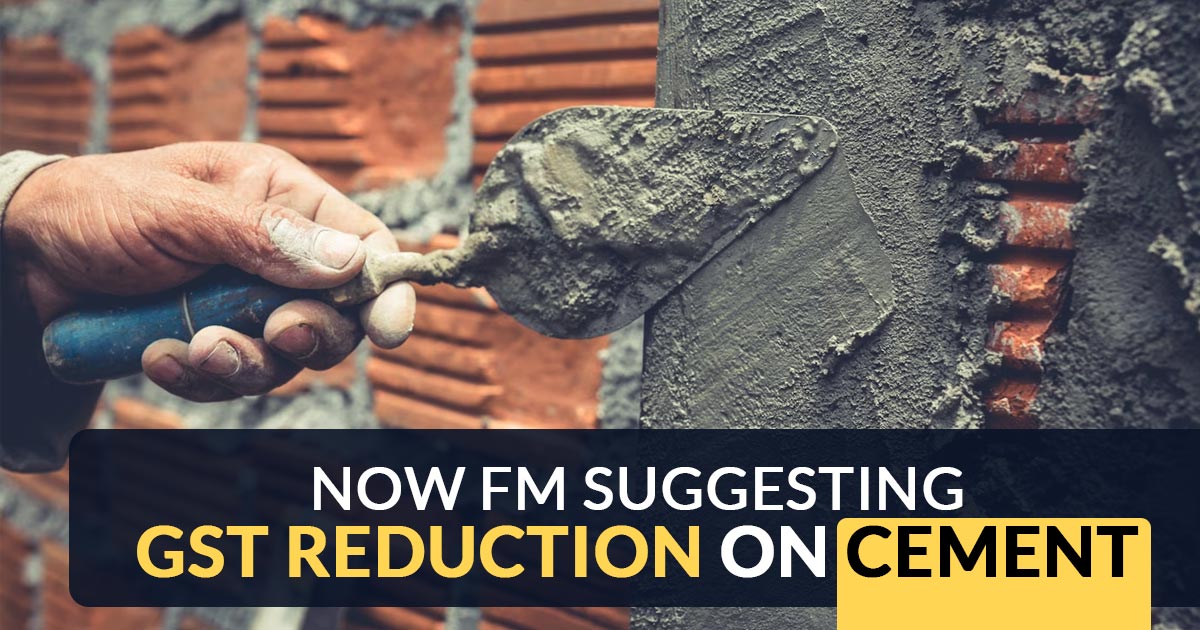
Tuesday, the government’s Finance Minister Nirmala Sitharaman said it will investigate lowering cement’s 28% Goods and Service Tax (GST) rate. In the midst of the present global unrest, she added, the nation has been able to get petroleum at comparatively reduced rates because of good leadership. She asked India Inc. for unconventional suggestions that would serve as a catalyst for more investment.
The minister stated at a post-Budget discussion with CII leaders that the possibility of a lower GST rate on cement will be looked into and, if necessary, referred to the GST fitment committee. She was replying to a recommendation that cement’s GST is reduced from the current 28%, which would aid in lowering building costs for both public works projects and private construction projects like homes. Government spending has been given top priority in the Budget FY24, with a specific emphasis on infrastructure sectors including railroads and roads.
Individuals use cement in non-bulk situations for things like building their own homes, but they often aren’t allowed to claim an input tax credit(ITC) for it.
Cement prices in India as a whole were flat month over month in January 2023. Regionally, prices increased marginally in the Central (+1.6%) and West (+1.1%) markets while falling by 1.5% in the South and East markets, respectively, and by roughly 1% in the North, the report stated.
The finance minister said, Buffer or no buffer, we will have to tackle the problem as it happens, in response to a query about whether the budget contains buffers against exterior shocks. She said that the government has done this even in the issue of the price of fertilizer in 2021. We imported more and more to make sure we didn’t let the farmers down. She emphasized that we did not push the cost of increased pricing to the farmer, adding that an initial additional provision had been made for it.
The minister also exhorted businesses to develop innovative ideas for investments and technologies and to find drivers other than production-linked incentives (PLI) for the expansion of sunrise industries. She also emphasized the need for businesses to develop novel ideas and collaborate with start-ups on cutting-edge technologies.
She said that the country has benefited from the strong leadership and administration throughout the present era of global unrest and turbulence by ensuring that fuel costs stay low and exports are not affected.
Read Also: 5th Union Budget 2023-24 Updates on Income Tax & GST
The national interest was prioritized because, without it, you wouldn’t have had fuel. We couldn’t have agreed to the current discussions on price caps since energy costs were rising. However, because of the PM’s worldwide engagement, strong leadership, and direction, we can now consistently buy fuel for much less money than we could anyplace else. And how has that benefited us? Similar concerns include obtaining fertilizer and guaranteeing uninterrupted exports. Globally, being able to make a decision, adopt a stance, and stick to it are all in our nation’s best interests, Sitharaman added later in her speech.
The minister also mentioned that since Covid, the industry has begun to look at the potential outside of its own industries and is now including green technology and the Sustainable Development Goals in their development plans. You are looking at technology that will help you be consistent with SDG targets as part of your investment plans, which are much more carefully considered and are not just for the sake of expansion. You can’t just expand based on demand or money, she added, adding that these choices would take longer to materialize. Even if the government has lowered the corporate tax rate, businesses will nevertheless take into account these energy and technology-related concerns before finalizing their expansion strategy.









